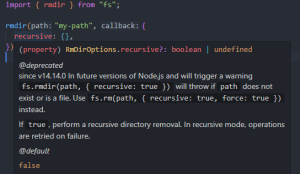Deprecated code. It’s a phrase that strikes fear into the hearts of developers everywhere! But don’t worry, this article is here to help you demystify the world of deprecated code and turn it into an exciting opportunity for your next software project. Get ready to learn everything you need to know about this hidden threat to your project’s success and how you can turn it into a superpower for your team. From the technical aspects of deprecated code to the best practices for managing it, we’ll cover it all. So, grab your favorite coding snack, settle into your comfy chair, and let’s get started!
What is Deprecated Code?
Deprecated code is a term used to describe parts of a software program that are no longer in use or supported. This can happen for a variety of reasons, such as advancements in technology, changes in user behavior, or the discovery of security vulnerabilities. When code is deprecated, it’s typically replaced by newer and more efficient alternatives.
Deprecated code can occur in software development when developers need to update or improve a program. They might discover that a certain piece of code is no longer relevant or necessary, or that it’s causing problems for the rest of the program. In these cases, developers will often mark the code as deprecated and replace it with a newer, more efficient solution.
Characteristics of deprecated code include outdated programming languages, functions, or libraries, as well as code that is no longer necessary or used in the program. It’s important to note that deprecated code can still be present in the program, even if it’s not actively being used. This can create problems for the software and its users, as well as slow down the development process.
By understanding what deprecated code is and how it occurs, you can take proactive steps to manage it and minimize its impact on your software project.


“Deprecated code can pose a significant challenge for developers as it may no longer be supported and could lead to compatibility issues and errors. Code maintainers have the responsibility to clearly indicate deprecated code and provide alternative solutions (when relevant), while developers who consume the code are responsible to act on deprecations and update their code accordingly. Staying updated and proactive in identifying and replacing deprecated code is crucial for a smooth and efficient development process.”
– Paul, Senior Software Engineer at Front-Commerce

What is Google Lighthouse?
Read our full guide
The Consequences of Deprecated Code
Deprecated code can have a significant impact on the success of a software project if it’s not properly managed. Here are some of the consequences of deprecated code:
- Technical issues: For example, it might result in bugs or crashes, or it might prevent the program from running efficiently.
- Reduced efficiency and performance: Deprecated code can slow down the performance of the software, making it less efficient and user-friendly. This can result in a negative user experience and reduced customer satisfaction.
- Security vulnerabilities: For example, it might contain exploits that can be exploited by attackers, or it might be vulnerable to malware or other forms of cybercrime.
- Increased development time and costs: Developers might need to spend more time troubleshooting problems caused by deprecated code, or they might need to completely refactor the code to make it work properly.
- Potential harm to brand reputation: If deprecated code results in technical problems, security vulnerabilities, or reduced performance, it can harm the reputation of the brand behind the software. This can negatively impact customer trust and loyalty, and it might also result in lost revenue and customers.
By being aware of the consequences of deprecated code, you can take steps to minimize its impact on your software project and ensure its success.

Did you know M-Commerce will be dominating in the coming years?
Managing Deprecated Code
Managing deprecated code is crucial for the success of any software project. Here are some practical steps you can follow to deal with deprecated code:
- Identify deprecated code: This first step can be done manually by reviewing the code, or with automated tools that can scan the code and identify deprecated code.
- Evaluate the impact of deprecated code: This will help you determine the extent to which deprecated code is affecting the functionality and performance of your software.
- Decide on a course of action: This could include refactoring the code, replacing it with a newer version, or ignoring it if it doesn’t have a significant impact on the software project.
- Refactor deprecated code: If the deprecated code has a significant impact on the software project, it’s recommended to refactor it. This involves updating the code to remove the deprecated elements and replace them with current, supported code.
- Replace deprecated code: This is a good option if the deprecated code is no longer supported and there is a suitable replacement available.
- Ignore deprecated code: If the deprecated code has a minimal impact on the software project, it might be acceptable to ignore it. However, it’s important to continuously monitor the deprecated code to ensure that it doesn’t become a bigger issue in the future.
By following these steps, you can effectively deal with deprecated code and minimize its impact on your software project. It’s important to approach the task of dealing with deprecated code proactively, as this will help ensure the long-term success of your software project.
“Deprecated code can be a real problem for developers as it makes the code harder to maintain, understand and debug. In the long run, that’s a lot of unnecessary hours of work because of this deprecated code. “
– Gaëtan, Developer at Front-Commerce

Don’t put off until tomorrow what you can do today
Deprecated code might seem like a minor issue, but it can have a major impact on the success of your software project. The good news is that with the right approach and tools, managing deprecated code doesn’t have to be a headache! By understanding what deprecated code is, being aware of its consequences, and following best practices for managing it, you can ensure that your software project is running smoothly and achieving its goals.
So go ahead, give deprecated code the attention it deserves and watch your software project soar! With the right approach, managing deprecated code can be a fun and rewarding experience that leads to success for your team and your customers.
